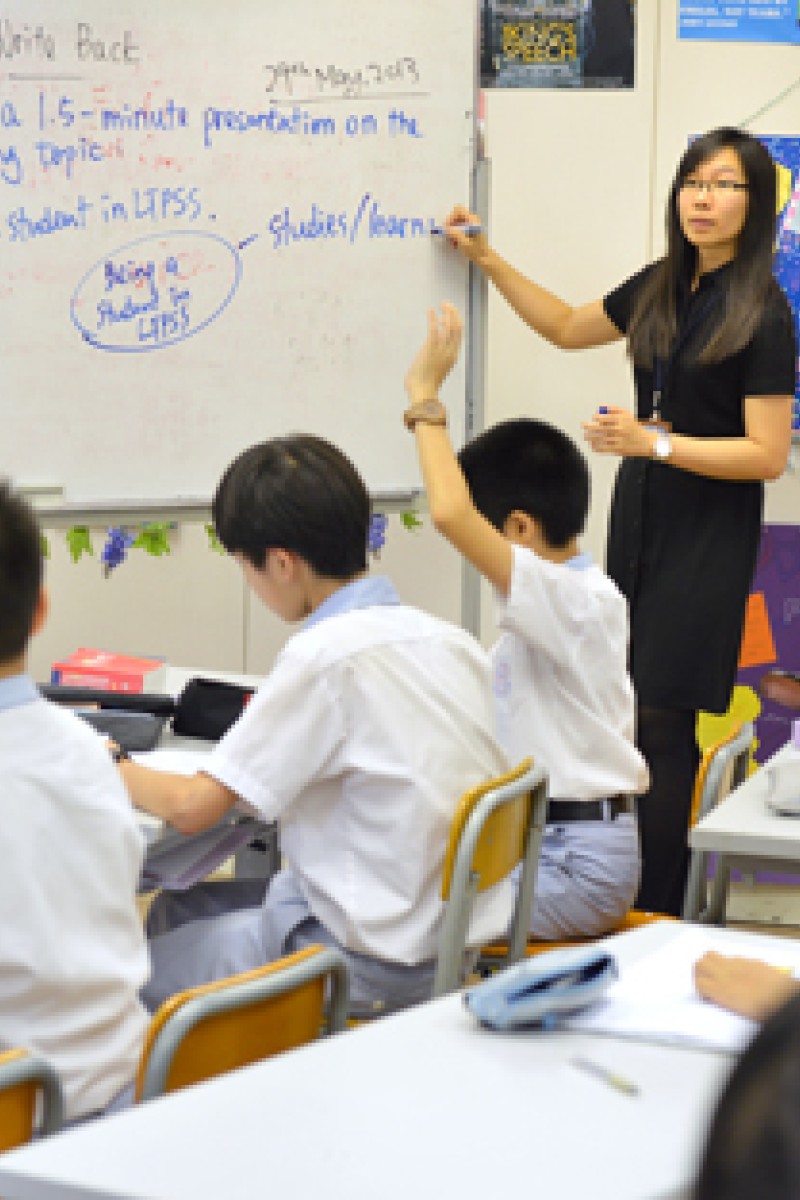 Teacher Winnie Chow leads an English class at Law Ting Pong Secondary School in Tai Po. Students have improved their English skills, thanks to a new teaching method which focuses on presentations and discussions.
Teacher Winnie Chow leads an English class at Law Ting Pong Secondary School in Tai Po. Students have improved their English skills, thanks to a new teaching method which focuses on presentations and discussions.Using the foreign tongue, they also share their school experiences with each other in groups and make short presentations to the class. The chatter of English fills the room while a teacher acts as a facilitator offering guidance on the side.
And the students are loving it.
"I love to discuss and take part in presentations. It makes the lesson more interesting and I can learn English better this way," says 12-year-old Ken Chan Shun-hei.
Natalie Wong Yuen-ting, 13, agrees: "Unlike in primary school, where we weren't allowed to talk, we have many chances to speak up here. My English has improved a lot."
They are engaged in an activity called "Write Back", developed by the school's team of English teachers who don't use textbooks for students from Form One to Form Three. Instead, they rely on a school-based curriculum they adopted in 2011.
English teacher Winnie Chow Wing-yi says the new study method work wells. "It gives teachers more [freedom] to cater to learners' differences. It also enhances our creativity as teachers," explains Chow, who has worked at the school for almost three years.
The teachers - and students - have Julian Harniess, an experienced educator from Britain, to thank for the innovations. Harniess taught in London and Germany for 18 years before coming to Hong Kong. Two years ago, he was invited by the school's principal to review its English curriculum, after teaching at South Island School for 14 years and at another local school for four years.
"I looked at the textbooks and thought they were dry. I went into the classrooms and saw a lack of creativity. The teachers were under a lot of pressure; they weren't happy," says Harniess, 67, who now works as an education consultant.
With the principal's full support, Harniess scrapped the textbooks starting from Form One. He brought language arts and literature into classrooms. "That is where English is best used," he says. "My goal is to get students to use English with confidence in real life by providing them a safe linguistic environment in the classroom."
But his unusual method was a bit challenging for some local teachers not used to teaching without textbooks. But with his demonstrations, guidance and support, they eventually came around to his teaching style.
Chow says the new method rekindled her enthusiasm as a teacher just when, frustrated, she was about to quit her job.
"Julian has inspired me a lot," the teacher says. "His teaching methods are creative and student-centred. With the new curriculum, students are motivated to learn, which is the most important thing."
The students don't seem to miss the textbooks much, either. "In the past, the teacher just read us from the textbook while we just sat and listened," Natalie says.
"Some passages sounded irrelevant and we didn't understand the lessons. But now we know what we're doing in class."
Ken agrees. "Without the textbook, we have more time to discuss and do things. We have to take notes and I know what I'm learning every day," he says.
